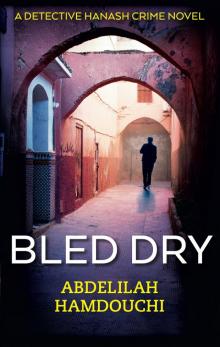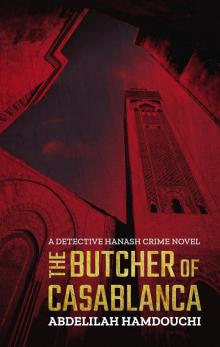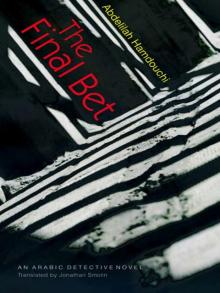- Home
- Abdelilah Hamdouchi
Whitefly Page 4
Whitefly Read online
Page 4
“But as far as I know,” said Laafrit calmly, “Morocco doesn’t officially recognize Sebta and Melilla as Spanish cities.”
The inspector hit the steering wheel with both hands and ignored the road entirely.
“And here we are, falling into their trap,” he said bitterly, “when we stop Africans from entering one of our own cities, charging them with the intent to immigrate illegally.”
Laafrit wanted to change the subject to something more interesting but Allal’s appetite for this subject only became more voracious. As they hit a steep decline ending in a dangerous curve, Laafrit reminded him to keep his eyes on the road.
“And worst of all,” added the inspector, practically screaming, “our children are dying in the sea like vermin to reach Spain while the Africans who manage to sneak into Sebta are collected in a transit camp there called Lacamorako.”
“Calamocarro,” Laafrit corrected.
Because the inspector was incapable of pronouncing the word correctly, he gesticulated wildly with his hands, completely ignoring the steering wheel.
“I don’t give a shit what its name is! What’s important is they collect these Africans in this camp and take them from there to Spain in groups, smoothing the way for them to get papers. But our children who survive the sea and make it to their shores without drowning, if they arrest them, they toss them back at us like unwanted fish.”
Laafrit decided it was time to cool the inspector down about liberating the two occupied cities.
“For the moment, our case is still at square zero,” he said, changing the topic.
“We shouldn’t hurry,” the inspector replied grudgingly. “We need to bide our time until we get the crime-lab report.”
“The lab report,” said Laafrit, “won’t tell us if the drowning victims were harraga or not. That much is sure. And I want to figure out that point before the crime lab sends its results. What’s confusing me so far is we don’t know yet if a patera set out sometime this week. As far as I know, it’s been two weeks since the last one. A Spanish patrol guarding the coast saved all twenty-three on board. It left from Sebta.”
The inspector slowed down and shook his head as if dispelling wandering thoughts.
“Why do you insist on linking the three drownings to the murder victim? It’s possible the drowned men were harraga and the one shot dead was a hash smuggler. Or some guy on a foreign boat.”
Laafrit paused, as if organizing his ideas. “First,” he said slowly, “the murder victim didn’t look like someone fleeing his assailant. The evidence shows he took the rounds from the front. This means he was dealing with his killer in some way. Second, the bullets were fired at very close range. This proves the intent to kill. Third, the shooting victim wasn’t wearing his jacket when he was killed. It was put on him after the murder.”
The inspector slowed down until they came to a stop.
“Who said he was knocked off at sea?” Allal asked, as if struck by a sudden burst of inspiration. “Why couldn’t he have been killed on land?”
3
ON THE HILLS OF TANGIER, Laafrit called his wife on his cell phone. It was 2:20.
“At the very least, you should’ve called to say you wouldn’t be coming home for lunch,” Naeema said, unable to get rid of the sharp tone in her voice.
Laafrit tightened his grip on the phone and gave the inspector a sidelong glance.
“Honey, do you think I could’ve called but didn’t?” he said in a gentle voice.
“Where are you calling from now?”
“We were on a trip to Ksar es-Seghir but we’re coming into the city now. How’s my girl?”
“Reem’s sleeping. Did you eat?”
“Not yet. I’m with Inspector Allal. We’ll have to make do with a sandwich and get back to work.”
After he hung up, Laafrit leaned back in his seat. The car entered the city, moving slowly in the far right lane. The inspector looked over at Laafrit.
“Where do you want to go?” Allal asked, about to stop.
“What do you think about Moulay Mouh?” asked Laafrit. “We can get rotisserie chicken with fries and a bottle of mineral water.”
The inspector shook his head.
“My friends on the night patrols pester him. Whenever he sees a squad car pull up in front of his place, his face turns pale.”
“Let’s go to Si Bouchta. His sausages are great.”
“I got dinner from him two days ago when I was working the night shift. Let’s leave him alone.”
“Take the boulevard,” ordered Laafrit. “Ba Driss owes me. He’s got a kofta grill.”
Allal shifted gears and floored it. The car jumped, letting out a screech. Five minutes later, they stopped in front of the grill. As soon as Ba Driss saw Laafrit, he left his customers and hurried over, wiping his hands on the apron tied around his waist.
Ba Driss gave them an exaggerated welcome and took their orders, bowing his head. In less than ten minutes, he brought them a black plastic bag full of food and then retreated quickly before they made any attempt to pay.
Before heading back to the station, Laafrit told the inspector to stop at the kiosk to return the pile of Arabic and Spanish newspapers he had picked up on the way to Ksar es-Seghir.
Inspector Allal said he was heading to the mosque for afternoon prayers. Laafrit jumped out at the station and hurried inside, carrying his food. Before he’d crossed the corridor to his office, a uniformed cop at the reception stopped him and told him a woman was waiting to see him. She’d said she was an acquaintance. Laafrit hid his surprise and hurried to see who this acquaintance might be. He found her sitting in the corridor with her head between her palms, rubbing her temples. Laafrit noticed her fingernails were coarse from excessive biting.
The woman stood up and extended her hand to him. The way she tried to avoid looking at him, together with the large black sunglasses hiding her eyes, frightened Laafrit. He examined her closely, trying to remember where he had seen her before. She felt his insistent stare and tried to smile.
“Maybe you don’t remember me,” she said. “I live on the same street as you. We’re neighbors.”
“I might recognize you,” said Laafrit slowly, “if you took off your sunglasses.”
A look of distress appeared on the woman’s face. She lowered her glasses slowly, as if preparing Laafrit for what he’d see. He was shocked when he saw the swollen bruise surrounded by a blue ring under her left eye. The detective wanted to ask her to wait so he could, at the very least, scarf down his food, but she didn’t give him the chance.
“Recognize me now?”
He nodded haltingly.
“Yes. You’re a teacher, right? Please come in.”
He hid the bag of food in a metal cabinet between the files and asked her to sit down.
“Who hit you?”
“My husband,” she replied, on the verge of tears.
He sat down opposite her, trying to hide his annoyance at this unexpected piece of business. He couldn’t put it off since she was a neighbor.
“Why?”
“Alcohol,” she blurted out. “He comes home every night after midnight staggering, in a pitiful state. When I try to talk to him, it just turns into a huge fight.” She swallowed with difficulty.
“Maybe you’ve heard us yelling? The whole neighborhood knows.”
She began to cry.
“Sir, I’m afraid my children will grow up traumatized by this. Yesterday, I decided to put an end to it but here you see the result,” she said, pointing to her black eye. “Look how he disfigured my face!”
The detective shook his head sympathetically. He winced because of the hunger pains in his stomach, but the woman interpreted it as sympathy.
“First time he hit you?”
“He always does it!” she burst out. “He attacks me and hits me, insults me and says horrible things to the kids. I didn’t want to come here but I can’t take it any more. I began fearing for my life when he sta
rted threatening to kill me.”
“Your husband’s a civil servant, right?” Laafrit said, trying not to yawn.
“Yes, he works in the employment office, but since there’s no employment these days, he’s practically out of work. He spends fifteen minutes in his office and the rest of the day at the bars.”
Laafrit smiled. The woman opened her handbag, took out a form, and handed it to the detective.
“Here’s a doctor’s statement. It grants me sick leave for two weeks.”
Laafrit looked over the paper, holding it in front of him.
“How many kids do you have?” he asked.
“A sixteen-year-old boy and a ten-year-old girl.”
“Anything in particular pushes him to this violent behavior?” Laafrit asked distractedly.
“Money!” she yelled out. “He wants me to give him my salary so he can drink it all away.”
The detective nodded again sympathetically.
“An officer will come take down your complaint in a bit,” he said in a shaky voice. “Then we’ll send a summons for your husband.”
A look of hesitation appeared on her face.
“Could he go to jail?”
“That’s for the court to decide.”
He gestured with his head toward the door but the grief-stricken woman remained fixed in her seat.
“That’s everything, ma’am.”
“But he is the father of my children,” she said quickly. “I don’t want him to go to jail. That’d get him fired. Can’t you bring him here and reprimand or scare him?”
“That might be possible,” said Laafrit. “Give me your address and your husband’s name. I’ll send the summons. It would be good for you to come too.”
Without taking down the information, Laafrit stood up quickly and led her to the door. He then rushed to the bag of food and took out half the kofta sandwich and a can of Coke. The small patties of ground meat were cold, with white specks of fat hardened on them, and from the first bite, Laafrit smelled something that killed his appetite. He thought it had too many spices, which were used only to mask the fact that the meat wasn’t fresh. After taking a deep disjointed breath, he tossed the sandwich and made do with just the fries.
Laafrit got up with hurried breath and didn’t spend his usual minute enjoying the view of the steamers sailing between the buildings. He felt cheated and resentful about his work conditions. People who stayed up all night for the safety of the country and its citizens should have their own cafeteria or get reimbursed for meals while working. Even overtime wasn’t acknowledged or paid. The station didn’t have a coffeemaker and all of the cops’ requests for coffee at the nearby cafés were granted as if they were begging for alms.
The ringing of his phone pulled him out of his depressing wanderings. It was the medical examiner, Professor Abdel-Majid, asking him to come to the morgue immediately. Laafrit put the receiver down and stood looking out the window until Inspector Allal finally got back from the mosque. Laafrit was in a terrible mood. His hunger had frayed his nerves and given him a stomachache.
“Send a summons to the address on the desk,” he told the inspector sharply, getting ready to leave. “Tell them to be here tomorrow at three o’clock.”
Laafrit slammed the door behind him and went through the corridor with long, heavy steps.
With its peeling walls and wooden doors with missing glass windows, the morgue hadn’t changed a bit since Laafrit first saw it years ago. Every door squeaked when opened, as if announcing a new arrival.
Professor Abdel-Majid, the chief medical examiner, wasn’t older than fifty but his occupation of “carving up” corpses had transformed him into a solemn man with sallow skin and a crooked back. Thanks to his thin shoes, he walked with silent steps. His eyes were devoid of life. He loved to work alone and hated when cops entered his “sanctum.” It was very rare one of them called to stick their nose in his work.
He met Laafrit in the courtyard and led him into the observation room.
“Since you’re the one who asked me to come,” said Laafrit, “you must have found something really interesting.”
“As I mentioned earlier, sir, I do not know how the shooting victim came to us together with the drowned men who are harraga.”
Laafrit hid his annoyance at the medical examiner’s formalities.
“Up to now,” he said, “we’re still looking for evidence confirming that they’re actually harraga.”
Professor Abdel-Majid looked closely at Laafrit.
“I have previously examined some corpses of harraga and the condition of these three does not differ from the condition of the others.”
“But if you permit, sir,” said Laafrit, using the same formalities as Professor Abdel-Majid, “we have not yet received any news of a patera that has set out recently. And you know these boats do not depart with three or four people on board as if they were in a taxi.”
“I asked you to come,” said the medical examiner, “to direct your attention to the murder victim. He has no connection whatsoever with the others, whether they are harraga or not.”
He led Laafrit to the metal table where the corpses were laid out. They were covered by a white sheet stained with dried blood. After a long pause, as if he wanted to scare Laafrit, the medical examiner pulled the sheet back from the corpses’ faces.
“Who among them is the shooting victim?” he asked, as if subjecting the detective to a test.
Laafrit thought the question was strange but he picked out the correct corpse without hesitating. The medical examiner nodded in approval and put the sheet back over the murder victim’s face. With the same silent steps, he walked to the analysis table and pointed to a jar containing a dark fluid.
“And these are the contents of your murder victim’s stomach. He bid adieu to the world after a tasty meal: salad with extra mayonnaise and seafood paella, topped off with a big piece of chocolate flan for dessert. All this was swimming in more than a liter of red wine.”
Laafrit was on the verge of laughing at the medical examiner’s strange way of presenting the information, but Professor Abdel-Majid took him by the hand like a student and led him to other jars.
“And now here you are standing in front of the contents of the harragas’ intestines. The same food in all three: a mix of vegetables, potatoes, tomatoes, and spicy pepper with lots of bread.”
Laafrit was more interested in the actual information Abdel-Majid was giving than the odd way he was giving it. He stayed silent for a moment. It crossed his mind, with some annoyance, that he was the one who’d insisted on analyzing the victims’ stomachs, but the medical examiner continued.
“And moreover, I found traces of vomit between the drowning victims’ teeth. As for your lead-filled friend, presumably he would have lost his dinner riding in a small shaky boat on rough waters, since his stomach was full to the brim. But he didn’t.”
“The shooting victim’s meal is like something served in a restaurant,” said Laafrit, emerging from his thoughts as if he had found confirmation for something that was on his mind. “The fact he didn’t vomit might be because he was murdered on dry land.”
The medical examiner blinked his eyes rapidly without saying a word.
“We are favorably disposed to this idea,” added Laafrit in a formal tone.
“Then you have to conduct an investigation into the restaurants specializing in fish and paella,” the medical examiner said, as if giving an order. “You don’t have to eat at them. It’s enough to ask for a menu and show them a picture of the victim.”
Laafrit didn’t know whether Professor Abdel-Majid was serious or joking. Whichever it was, his solemn air remained unchanged.
Laafrit asked for a few minutes to examine the victims’ clothes again. He concentrated his attention on the shooting victim’s jacket. The medical examiner gave him a magnifying glass and shone a bright light on the jacket. Laafrit confirmed that it didn’t have any trace of the bullets on it.
> Abdel-Majid turned off the light. The medical examiner moved the muscles of his face with difficulty, but despite the effort he only produced a faint smile. Once again he took Laafrit by the hand and led him to a metal examination table. On it was a glass tank full of translucent fluid, in the middle of which was a small coin. The medical examiner opened his arms as if presenting a rare gem.
“And now sir, if you please, I present to you my special discoveries that are of no use to any investigation. I extracted this coin from the shooting victim’s stomach. He swallowed it when he was a child and it remained in his body. As you see, the stomach acid dulled the coin’s surface.”
“Wasn’t it dangerous?” asked Laafrit, astonished.
Professor Abdel-Majid laughed for the first time, but with a kind of nervousness.
“You cannot imagine how many of these I have extracted.”
Laafrit smiled and thought he might have misjudged the medical examiner. Despite his appearance, which could be hard to digest, he might actually be witty.
Abdel-Majid accompanied Laafrit to the courtyard with his silent, cautious walk, as if he were afraid of stepping on an explosive.
“Please hurry and ID the victims,” said the medical examiner. “My freezer is so full I cannot accept any new guests.”
Laafrit let out a laugh and shook his hand warmly.
“I hope we get that crime-lab report soon,” he said.
Laafrit sat outside the morgue in his black Fiat without turning on the engine. He leaned back in the driver’s seat and put a menthol lozenge in his mouth. He needed one to help him collect his thoughts.
At this point, three days had passed since the first drowned body turned up and it had been twenty-four hours since they discovered the shooting victim. Laafrit knew from experience the first twenty-four hours were critical. But here he was, facing drowned bodies and someone shot dead without identifying the victims or the type of the gun. The whole investigation was still only groundless conjecture.
What interested Laafrit was that he had found a way to differentiate the drowned bodies from the shooting victim. Everything he’d done up to this point was for this. But what he was hoping to discover was that the drowned men were actually harraga. If that were the case, he’d be able to eliminate all the random possibilities and just follow leads on the murder. But he still couldn’t deduce any real facts from the information he had. The case had holes so big even a clairvoyant couldn’t have filled them in.

 Bled Dry
Bled Dry The Butcher of Casablanca
The Butcher of Casablanca The Final Bet
The Final Bet Whitefly
Whitefly